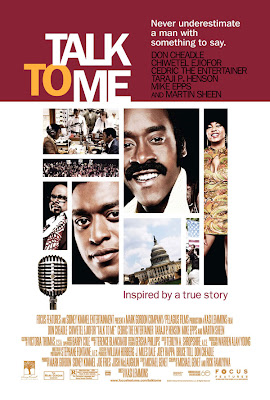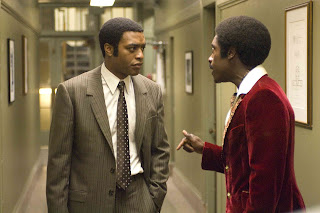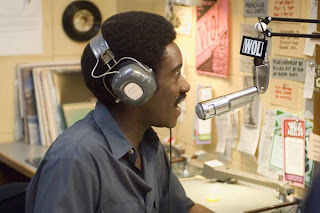Talk to Me
Director: Kasi Lemmons
Starring: Don Cheadle, Chiwetel Ejiofor, Taraji P. Henson
It becomes more and more apparent to me that Chiwetel Ejiofor is becoming one of my favorite actors when I realize that I don't have to spell check his name anymore after I type it. In Talk to Me, he plays Dewey Hughes, the director of programming at WOL-AM in Washington, DC. Hughes was born in the projects but grew up watching The Tonight Show with Johnny Carson; learning more from Carson than he did from his surroundings, Hughes separated himself from his upbringing and made a name for himself in the radio industry. When a divide forms between the listener's tastes and the music being played at WOL, Hughes brings in Petey Greene (Cheadle), a fresh-outta-jail man who discovered his natural talent as a DJ in prison. Where Petey goes, his girlfriend Vernell Watson (Henson) isn't far behind, and as Petey's "tell-it-like-it-is" mentality causes his popularity to skyrocket, so do the station's ratings.
In some ways, the film serves as a warning against living vicariously through other people. Hughes, who always idolized Carson and longs for the gift naturally bestowed upon Petey, becomes Petey's manager and guides him through his meteoric rise to stardom. It's clear Petey doesn't want all of the new responsibilities given to him, but Dewey is too blinded by his own dream to deal with his friend's life.
Everyone in the cast did an outstanding job, including brief supporting turns by Martin Sheen and Cedric the Entertainer. Henson stole every scene she was in as the loud-mouthed Vernell, wonderfully decked out in costumes accurate for the time and seeming as if she were born to live in that era. But Don Cheadle took hold of this film and made it his; his performance as Petey Greene runs the gamut from cocky self-assuredness (when he first gets out of prison) to heartbreaking sadness (when he hears the news of Martin Luther King, Jr.'s assassination).
Technically speaking, this movie didn't give us anything new - but it worked exactly as it should have in context with this story. The cinematography, lighting, sound design, and production design were all crafted with one aspect in mind: highlighting the performances of the actors. Talk to Me isn't a movie with flashy editing or elaborate crane shots; this film doesn't need any of that. It is the story of a small unit of people and their journey through the world of entertainment, but more important than their physical journey is the professional and personal relationship formed between Dewey Hughes and Petey Greene. Stylistically, the film wisely chooses to stay grounded in reality instead of making us marvel at impressive directorial choices. (Although my favorite scene in the film, the first pool hall scene, was fairly stylized. But it shied away from being gimmicky, so I was OK with it.)
This is one of the best biopics I've seen. Even though it goes through some familiar paces, the enthusiasm of Greene's character pulls you through the sometimes-trite scenes and left me with a fresh perspective about a man who truly made a difference in the world of radio. Throw this in your Netflix queue (or whatever), because I'll recommend it for everyone. Until next time...





1 comment:
情色做愛限制級波霸口交18禁貼圖寫真視訊援交露點爆乳潮吹裸體裸照裸女愛愛無碼尋夢視訊聊天a漫a片a圖一夜情一葉情人妻激情情色寫真美女自拍辣妹自拍正妹自拍美女走光辣妹走光正妹走光